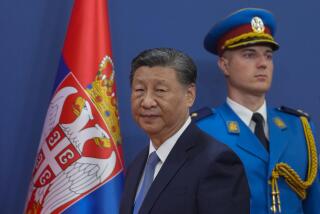China turns on charm for summit with African nations
- Share via
BEIJING — As heads of state and dignitaries from 48 African nations poured into this city Wednesday to attend the largest summit China has ever played host to, signs of courtship were everywhere.
Bright red banners lining the streets proclaimed, “Friendship, Peace, Cooperation and Development.” Giant billboards showed giraffes and elephants at play on the savannas of Africa, the “land of myth and miracle.”
China’s charm offensive reflects not only the nation’s growing reliance on African raw materials to feed its economy, but also its determination to rival the West as a model and financier for the developing world.
“China and Africa are attracted to each other,” said He Wenping, director of the African Department at the Chinese Academy of Social Sciences’ Institute of West Asian and African Studies. “There are lots of things African countries need. They want options. They want to look to the East.”
Chinese officials have designed the upcoming three-day summit, part of the third Forum on China-Africa Cooperation, as an all-out campaign to win over African hearts and minds.
Trade between China and Africa has roughly quadrupled since the first forum in 2000, reaching almost $40 billion last year, with China soaking up African oil, copper, minerals and more.
Over the last decade, Chinese companies have plunged capital into African projects, including railways in Angola, telecommunications in Nigeria and hotels in Sierra Leone. And the Chinese government has extended African nations more than $1 billion in debt relief.
For African leaders, He said, part of the appeal of Chinese money is that it often comes without strings attached, unlike funds from other sources, such as the World Bank, which insist on environmental or labor stipulations or try to impose penalties for corruption.
“They are fed up with taking orders,” He said. “They cherish their sovereignty and their dignity. They want to be an equal partner.”
Critics have countered that the Chinese help prop up abusive governments.
Some in Africa have come to see China’s increasing influence as a new kind of colonialism. In Zambia this year, African workers at a Chinese-owned mine rioted over poor working conditions and low wages.
As Beijing’s most elaborate meeting in recent memory, the summit set to begin Friday may serve a secondary purpose -- as a dry run for the traffic and security concerns that will accompany the 2008 Olympics.
More to Read
Sign up for Essential California
The most important California stories and recommendations in your inbox every morning.
You may occasionally receive promotional content from the Los Angeles Times.













